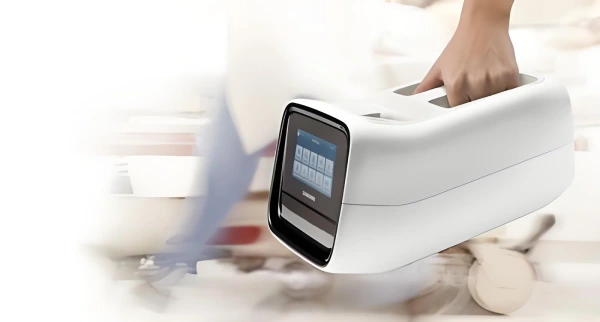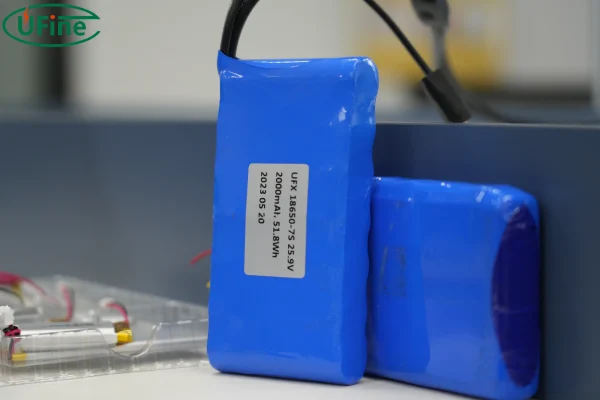Medical device batteries, especially lithium batteries, have high energy density, long life, and environmental protection, making them an ideal power source choice in the field of medical devices and health monitoring, providing people with more convenient and efficient medical services and health monitoring methods.
Part 1. Medical device batteries type
Common rechargeable batteries for medical device batteries include nickel metal hydride batteries, nickel-cadmium batteries and lead-acid batteries. With the outstanding advantages of lithium batteries in terms of cost, safety, and longevity, most medical equipment currently uses lithium-ion batteries (packs) or lithium-ion batteries instead. However, there are still very few medical devices still in use nickel metal hydride or lead acid batteries.
As the demand for portable medical electronic equipment increases, the demand for lithium batteries for medical equipment also increases. There are many types of lithium batteries used in medical devices. The types of medical device batteries are mainly customized according to the actual needs of medical devices.
Types of lithium batteries for medical equipment can be classified from the following perspectives:
1. Chemistry
Lithium batteries include lithium-ion batteries, lithium iron phosphate batteries, and lithium polymer batteries. What kind of lithium battery to use mainly depends on the performance requirements of the medical device for lithium batteries.
2. Discharge performance
Lithium batteries are classified according to discharge performance into conventional discharge lithium batteries, high-rate lithium batteries, low-temperature batteries, etc. These are also medical device batteries customized for specific applications.
3. Shape
Lithium batteries can be divided into cylindrical lithium batteries, prismatic lithium batteries, and lithium polymer lithium batteries according to their shape. The first two types are unsuitable for electronic medical devices due to their fixed shapes. But polymer lithium batteries are different. Their shapes can be customized and can be applied to most medical devices.
The portability of medical equipment functions and home-based product applications have become the development trend of the entire industry. Therefore, many portable wireless electronic medical devices have appeared, so there are many types of lithium batteries for medical devices.
Part 2. Why should you choose lithium batteries for your medical devices?
Lithium batteries for medical devices have the following 10 characteristics:
1. safer
Regarding medical equipment, safety is, of course, the first priority. Lithium batteries dedicated to medical equipment generally use 18650 lithium batteries or polymer lithium batteries. The good consistency of 18650 batteries and the good safety performance of polymer batteries have greatly improved the safety and stability of lithium batteries and battery packs.
2. Higher energy density ratio
Lithium-ion battery packs are smaller in size. Lithium batteries store higher electrical energy in the same volume compared to other medical device batteries.
3. Better cycle performance
The charge and discharge times of medical device lithium batteries are generally greater than 500 times. The discharge rate is between 0.5C and 10C. The performance of medical device lithium batteries completely exceeds that of early lead-acid or nickel-metal hydride batteries.
4. Longer battery life
Because lithium batteries have a higher energy density ratio, they provide longer battery life than lead-acid or nickel-metal hydride batteries at the same weight.
5. Better charging capacity
When a fully charged medical device lithium battery (pack) is idle for 3 months, its charge capacity still exceeds 80%. The charge capacity of lead-acid or nickel-metal hydride batteries is only about 40%.
6. Better high and low temperature performance
Medical device lithium batteries (packs) can work normally at -20°C. Lead-acid or nickel-metal hydride batteries can operate normally at a minimum of -10°C.
7. Wide operating temperature range
Medical device lithium batteries (packs) operate from -20°C to 60°C. For example, the low-temperature lithium battery or high-temperature lithium battery customized by Ufine Battery has an operating temperature range of -40°C or 85°C.
8. Lithium battery has a low self-discharge rate
The self-discharge rate of lithium-ion batteries is related to the thermodynamic instability of lithium-intercalated carbon materials in non-aqueous electrolyte systems. During the first charge and discharge process, a layer of solid electrolyte interphase (SEI) film will be formed on the carbon-negative electrode’s surface due to the electrolyte’s reduction. Lithium ions are allowed to pass through, but not electrons. And make the electrode active materials of different charge states relatively stable.
At the same time, the current lithium battery material system is mature, the production and manufacturing process is highly automated, and the product consistency is good, so it has a low self-discharge rate.
9. Customizable shapes
Due to the particularity of medical devices, you can find professional lithium battery manufacturers like Ufine Battery to customize medical device batteries. By choosing Ufine Battery, the thickness and shape of medical device batteries can be changed according to different medical devices to meet their needs.
10. Green and environmentally friendly
Medical device batteries (packs) do not contain lead, chromium, mercury, and other toxic and harmful substances. At the same time, because medical device batteries must be well sealed, very little gas is released during use and does not cause environmental pollution.
Part 3. Advantages of Lithium polymer batteries for medical device
Lithium polymer medical device batteries are commonly used in medical equipment for outdoor rescue defibrillation monitors, blood pressure monitors, wearable blood oxygen monitors, palm-held ECG monitors, wearable single-lead ECG monitors, etc.
1. Safer
Most medical device batteries use lithium polymer batteries. This is different from the metal casing of a liquid battery. If a dangerous accident occurs, liquid batteries are very easy to explode. And medical device batteries will only bulge.
2. Volume and shape
The wall thickness of lithium polymer batteries is small and can be as thin as 0.45mm. At the same time, it can withstand certain bending or twisting conditions without affecting the performance of medical device batteries. However, there are still technical bottlenecks in the wall thickness of liquid lithium-ion batteries below 3.6mm.
3. Lighter
Medical device batteries use lithium polymer batteries, which are relatively light in weight. The weight is 40% lighter than steel-cased lithium batteries with the same capacity and specifications and 20% lighter than aluminum-cased batteries.
4. Customizable
The shape of lithium polymer batteries can be customized. For example, Ufine Battery can increase or decrease battery wall thickness or change the shape of medical device batteries according to customer needs to improve the performance of medical devices.
5. Capacity
Compared with steel-cased batteries of the same size and specification, medical lithium polymer batteries have a 10-15% higher capacity and 5-10% higher than aluminum-cased batteries.
6. Resistor
Lithium polymer batteries are manufactured using lamination processing technology. After special design, the impedance of medical device batteries can be greatly reduced, and the performance of high-current discharge of medical device batteries can be greatly improved.
Part 4. What medical devices use lithium ion batteries?
1. Portable medical device batteries
As people demand convenient and efficient medical services increases, portable medical equipment has become a trend. Lithium batteries’ high energy density and long life allow portable medical devices to be used longer and more conveniently for patients. For example, portable electrocardiographs, blood pressure monitors, blood glucose meters, and other equipment can use lithium batteries as power sources to provide long-term monitoring and recording functions.
2. Wireless medical device batteries
Lithium batteries’ high energy density and stability make it possible to make medical devices wireless. Using lithium batteries as power sources, medical equipment can get rid of traditional wired connections and achieve wireless transmission and remote monitoring. For example, wireless heart monitors, blood pressure monitors, and other devices can be connected to mobile phones or computers through Bluetooth or Wi-Fi to achieve real-time data transmission and remote monitoring.
3. Electronic prosthetics and hearing aid batteries
The high energy density and long life of lithium batteries make the use of medical devices such as electronic prostheses and hearing aids more convenient and long-lasting. Lithium batteries can provide stable power to ensure the normal operation of electronic prostheses and hearing aids. At the same time, the lightweight characteristics of lithium batteries also make electronic prostheses and hearing aids more comfortable.
4. Smart bracelets and smartwatch batteries
As important devices for health monitoring, smart bracelets, and smart watches usually require long-term use. The high energy density and long life of lithium batteries can ensure long-term use of smart bracelets and smart watches. They can also provide stable power to ensure the normal operation of the equipment.
5. Thermometer and oximeter
Thermometers and oximeters are important equipment for health monitoring and are often used in home environments. The environmental protection and long life of lithium batteries allow thermometers and oximeters to be used for a long time, reducing environmental pollution. At the same time, the high energy density of lithium batteries can also provide a stable power supply to ensure the accuracy and reliability of the device.
6. Remote monitoring of health monitoring equipment
Lithium batteries’ high energy density and stability enable remote monitoring of health monitoring devices. By using lithium batteries as power sources, health monitoring equipment can achieve real-time data transmission and remote monitoring. For example, remote ECG monitoring equipment can be connected to a mobile phone or computer through Bluetooth or Wi-Fi to achieve real-time transmission and remote monitoring of ECG data.
Part 5. Medical device battery manufacturers
When it comes to high-quality medical device batteries, choosing a reliable manufacturer is crucial. Ufine Battery is a top choice, known for its expertise in custom lithium batteries. Based in China, Ufine Battery specializes in creating a wide range of lithium battery products to meet various needs.
Ufine Battery offers a diverse selection of batteries, including:
- Lithium Polymer Batteries: Known for their lightweight and flexible design.
- 18650 Batteries: Popular for their high energy density and long cycle life.
- Lithium-Ion Batteries: Ideal for portable devices.
- LiFePO4 Batteries: Known for their safety and stability.
- Cylindrical Batteries: Suitable for a variety of applications.
- Special Shape Batteries: Custom shapes to fit unique requirements.
- High Temperature Batteries: Designed to operate in extreme conditions.
- Low Temperature Batteries: Maintain performance in cold environments.
Ufine Battery can customize batteries to fit various sizes, voltages, capacities, and shapes, ensuring you get the perfect battery for your device. Their commitment to quality and innovation makes them a trusted choice for anglers looking for reliable power solutions.
Choosing the right medical device battery is essential for a successful and enjoyable using experience. With the right knowledge, you can select a battery that meets your needs and lasts a long time. Remember to consider factors like battery type, size, voltage, and capacity. And don’t forget to invest in a good charger to keep your battery in top condition. For high-quality custom batteries, Ufine Battery is a top choice.
Part 6. FAQs
-
What types of batteries are used in medical devices?
Medical devices commonly use lithium-ion, alkaline, or rechargeable batteries. -
How long do medical device batteries typically last?
Battery lifespan varies depending on usage and type but generally lasts months to years. -
Can medical device batteries be recharged?
Some medical device batteries are rechargeable, while others are disposable and cannot be recharged. -
Are there any special considerations for storing medical device batteries?
Store batteries in a cool, dry place and avoid extreme temperatures or moisture. -
How can I dispose of medical device batteries safely?
Follow local regulations for battery disposal or return them to the manufacturer for proper recycling. -
What are some common signs that a medical device battery needs replacement?
Signs include decreased performance, failure to hold a charge, or low battery indicators. -
Are there any risks associated with using expired medical device batteries?
Expired batteries may not perform optimally, leading to device malfunction or failure. -
Can I use third-party batteries in my medical device?
It’s recommended that the device manufacturer approve batteries to ensure safety and performance. -
Do medical device batteries require any special maintenance?
Keep battery contacts clean and inspect for damage regularly to maintain optimal performance. -
How can I extend the lifespan of my medical device batteries?
Avoid overcharging, store batteries properly, and follow the manufacturer’s guidelines for usage and maintenance.
Related Tags:
More Articles

LiPo Battery Discharge Rate Guide & Calculation Tips
Understand LiPo battery discharge rates, C-ratings, and how to calculate max current. Essential guide for RC, drones, and electronics users.
High‑Capacity 3S LiPo Batteries: 5000 mAh vs. 10000 mAh
Compare 3S LiPo 5000mAh vs 10000mAh batteries by weight, power, and use. Find the best fit for your drone, RC car, or boat setup.
Top 5 Applications for Small 3S LiPo Batteries
Small 3S LiPo batteries power drones, RC gear, wearables, and robotics with high energy and low weight. Making them ideal for compact electronics projects.
Building and Charging Your Own 3S LiPo Pack: A Step‑by‑Step Guide
Learn how to build, balance, and charge a 3S LiPo battery pack safely at home with this complete DIY guide for hobbyists and beginners.
How to Choose the Right LiPo Battery Plug Type?
Discover the best LiPo battery plug types, how to choose them, and expert tips for safe usage, soldering, and maintenance.






